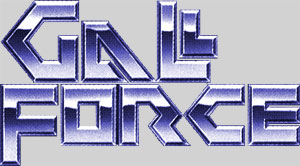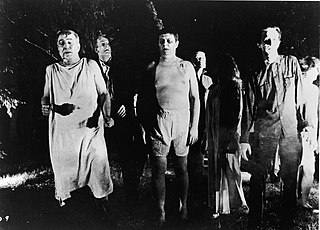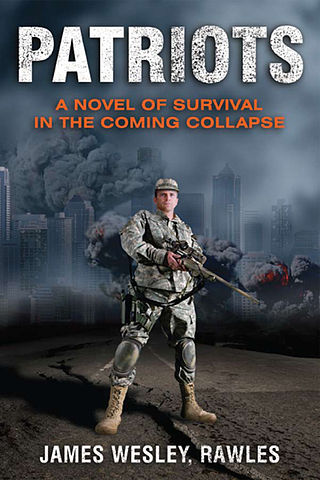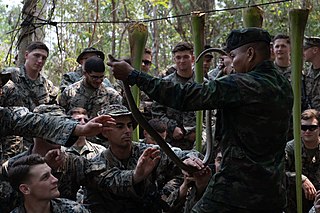
Gamma World is a post-apocalyptic science fantasy role-playing game in which player characters explore Earth centuries after the collapse of civilization, searching for artifacts from the time before "The Great Upheaval". The game was originally designed by James M. Ward and Gary Jaquet, and first published by TSR in 1978. It borrows heavily from Ward's earlier role-playing game, Metamorphosis Alpha.

Apocalyptic and post-apocalyptic fiction is a subgenre of science fiction in which the Earth's civilization is collapsing or has collapsed. The apocalypse event may be climatic, such as runaway climate change; astronomical, an impact event; destructive, nuclear holocaust or resource depletion; medical, a pandemic, whether natural or human-caused; end time, such as the Last Judgment, Second Coming or Ragnarök; or any other scenario in which the outcome is apocalyptic, such as a zombie apocalypse, cybernetic revolt, technological singularity, dysgenics or alien invasion.

Fallout is a media franchise of post-apocalyptic role-playing video games created by Tim Cain and Leonard Boyarsky, at Interplay Entertainment. The series is set during the first half of the 3rd millennium, and its atompunk retrofuturistic setting and artwork are influenced by the post-war culture of the 1950s United States, with its combination of hope for the promises of technology and the lurking fear of nuclear annihilation. A forerunner of Fallout is Wasteland, a 1988 game developed by Interplay Productions. Fallout is regarded as a spiritual successor to Wasteland.
Survivalism is a social movement of individuals or groups who proactively prepare for emergencies, such as natural disasters, and other disasters causing disruption to social order caused by political or economic crises. Preparations may anticipate short-term scenarios or long-term, on scales ranging from personal adversity, to local disruption of services, to international or global catastrophe. There is no bright line dividing general emergency preparedness from prepping in the form of survivalism, but a qualitative distinction is often recognized whereby preppers/survivalists prepare especially extensively because they have higher estimations of the risk of catastrophes happening. Nonetheless, prepping can be as limited as preparing for a personal emergency, or it can be as extensive as a personal identity or collective identity with a devoted lifestyle.
Jerome Morrell Ahern was an American writer of science fiction and action novels, non-fiction books, and articles for various firearms publications. He was considered an expert on firearms and related accessories, produced his own line of holsters, and served as president of a firearms company.

Gall Force is a metaseries of science fiction anime OVAs by the studios Artmic and AIC, with production by Youmex. The original character designs were by Kenichi Sonoda, though these were dropped for the Gall Force: The Revolution remake. Central Park Media has licensed most of the films and OVAs with the exceptions of Ten Little Gall Force, Scramble Wars, and The Revolution.
The concept of a mutant is a common trope in comic books and science fiction. The new phenotypes that appear in fictional mutations generally go far beyond what is typically seen in biological mutants and often result in the mutated life form exhibiting superhuman abilities or qualities.

Robinsonade is a literary genre of fiction wherein the protagonist is suddenly separated from civilization, usually by being shipwrecked or marooned on a secluded and uninhabited island, and must improvise the means of their survival from the limited resources at hand. The genre takes its name from the 1719 novel Robinson Crusoe by Daniel Defoe. The success of this novel spawned so many imitations that its name was used to define a genre, which is sometimes described simply as a "desert island story" or a "castaway narrative".

Subterranean fiction is a subgenre of speculative fiction, science fiction, or fantasy which focuses on fictional underground settings, sometimes at the center of the Earth or otherwise deep below the surface. The genre is based on, and has in turn influenced, the Hollow Earth theory. The earliest works in the genre were Enlightenment-era philosophical or allegorical works, in which the underground setting was often largely incidental. In the late 19th century, however, more pseudoscientific or proto-science-fictional motifs gained prevalence. Common themes have included a depiction of the underground world as more primitive than the surface, either culturally, technologically or biologically, or in some combination thereof. The former cases usually see the setting used as a venue for sword-and-sorcery fiction, while the latter often features cryptids or creatures extinct on the surface, such as dinosaurs or archaic humans. A less frequent theme has the underground world much more technologically advanced than the surface one, typically either as the refugium of a lost civilization, or as a secret base for space aliens.

Max Rockatansky is the title character and antihero protagonist of the Australian post-apocalyptic action film series Mad Max. Created by director George Miller and producer Byron Kennedy, the character was played by actor Mel Gibson in the first three films from 1979 to 1985, by Tom Hardy in the fourth film in 2015, and a cameo appearance by Jacob Tomuri in the prequel spin-off film Furiosa: A Mad Max Saga in 2024.

Swan Song is a 1987 horror novel by American novelist Robert R. McCammon. Published June 1, 1987, it is a work of post-apocalyptic fiction describing the aftermath of a nuclear war that provokes an evolution in humankind. Swan Song won the 1987 Bram Stoker award, tying with Stephen King's Misery.

World War III, sometimes abbreviated to WWIII, is a common theme in popular culture. Since the 1940s, countless books, films, and television programmes have used the theme of nuclear weapons and a third global war. The presence of the Soviet Union as an international rival armed with nuclear weapons created persistent fears in the United States and vice versa of a nuclear World War III, and popular culture at the time reflected those fears. The theme was also a way of exploring a range of issues beyond nuclear war in the arts. U.S. historian Spencer R. Weart called nuclear weapons a "symbol for the worst of modernity."

Zombie apocalypse is a subgenre of apocalyptic and post-apocalyptic fiction in which society collapses due to overwhelming swarms of zombies. Typically only a few individuals or small bands of survivors are left living. In some versions, the reason the dead rise and attack humans is unknown, in others, a parasite or infection is the cause, framing events much like a plague. Some stories have every corpse rise, regardless of the cause of death, whereas others require exposure to the infection.

Dies the Fire is a 2004 alternate history and post-apocalyptic novel by Canadian-American writer S. M. Stirling. It is the first installment of the Emberverse series and is a spin-off from S. M. Stirling's Nantucket series in which the Massachusetts island of Nantucket is thrown back in time from March 17, 1998, to the Bronze Age.
Endworld is a series of post-apocalyptic novels written by David L. Robbins. The first book was published in 1986. As of 2021, there have been 31 novels written in the main series, along with three prequels and a crossover novel with his "Wilderness" series. David Robbins also wrote a 13 novel spin-off to this series called Blade.

The Patriots novel series is a five-novel series by survivalist novelist and former U.S. Army officer and blogger, James Wesley Rawles. It is followed by his Counter-Caliphate Chronicles novel series.
Night of the Living Dead is a zombie horror media franchise created by George A. Romero beginning with the 1968 film Night of the Living Dead, directed by Romero and cowritten with John A. Russo. The franchise predominantly centers on different groups of people attempting to survive during the outbreak and evolution of a zombie apocalypse. The latest installment of the series, Survival of the Dead, was released in 2009, with a sequel, Twilight of the Dead, in development. This would be the first film in the series not directed by George Romero, who died on July 16, 2017.

Survival or survivorship, the act of surviving, is the propensity of something to continue existing, particularly when this is done despite conditions that might kill or destroy it. The concept can be applied to humans and other living things, to physical object, and to abstract things such as beliefs or ideas. Living things generally have a self-preservation instinct to survive, while objects intended for use in harsh conditions are designed for survivability.












